EYFS activities are what make a child’s time at nursery so enjoyable. However, thinking of new and fresh ideas the children will love can leave you in a scroll hole on your favourite social media platform.
If you’re looking for a big bundle of EYFS activities that are engaging, easy to resource and linked to the seven areas of learning – you’ve found it!
How do you plan EYFS activities?
Choosing an EYFS activity should include more thought than ‘that looks like a nice idea’. Early years activities that are varied and linked explicitly with the seven areas of learning and development help children build a balance of skill and knowledge.
“Think of a child’s development like an old-fashioned Egyptian pyramid. In order for the child to reach the pinnacle, there first must be solid foundational blocks. Each of these blocks should be the same size.”
Clare Stead, Early Years expert and founder of Oliiki Tweet
Some children may be more motivated than others to engage in detail-oriented activities (like fine motor skill development). Having a wide range of EYFS activities up your sleeve can help to build a broad range of skills and competency across each of the seven areas of learning.
Before you plan your EYFS activities, you should look at the learning dynamics in your nursery. For example, if your nursery room has a large proportion of children with Special Educational Needs and Disabilities (SEND), this will influence the direction of your planning.
EYFS activities for communication and language development
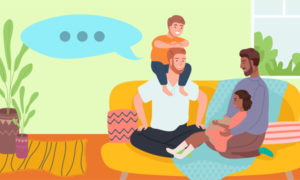
Communication and language is one of the three prime areas of learning. Understanding others and sharing thoughts and feelings are needed to build friendships, confidence, and interest in the wider world.
Many communication and language activity ideas and games don’t need resourcing (a bonus!) and can be played in a spare 5 minutes or even during an outdoor walk.
Get creative with some EYFS communication and language activities. Here are some of our favourites:
Would you rather?
Ask questions during a walk, car or train journey. You can start with easy options like, would they rather be a lion or a monkey? And expand their imagination further by asking if they would rather be a monster-sized insect or an insect-sized monster.
Can you find me the...?
Great for those children between 12-24 months who understand more than they can verbally communicate. Play the game to help tidy up, or get outside and see what you can notice when out in nature. Sharing these activities via Blossom’s Parent App can give parents inspiration for games to try at home.
Teddy bear's picnic
You may not realise how many social cues are involved in a teddy bear’s picnic or a tea party. Encourage your nursery children to serve delicious food and drink indoors or outdoors – you can even read the age-old favourite story, A Tiger Who Came to Tea.
Swing, swing
Outdoor playtime runs smoothly when children can take turns and play together. If your nursery has a swing set, encourage the children to work together to give simple instructions of go, stop, fast or slow.
For more ideas, check out our full list of 19 Activity ideas for outstanding communication and language development in EYFS
PSED EYFS activity ideas for your nursery
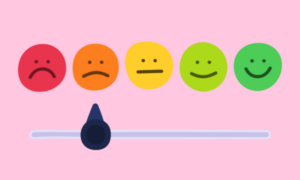
Everyday activities you organise for the children in your care will help to support their Personal, Social and Emotional Development (PSED). You can play several games with children to help them develop these essential skills further.
Let’s look at some simple EYFS PSED activities you can try.
Emotional regulation activities
Emotional regulation is a skill that most adults haven’t quite nailed yet. Beginning to recognise, accept and then regulate feelings (big or small) at an early age is essential for building a strong understanding of self.
Sensory circuits can help to regulate children’s emotions when they are feeling dysregulated. Record any changes to a child’s behaviour through staff observations, these can be saved for other practitioners to access or shared with parents.
Bunny breathing
Mindfulness activities for EYFS are a great way to build the skill of focusing on the present. It can help settle a child if they are anxious or worried. Try great ideas like bunny, teddy or feather breathing with your child. You might be surprised how much you find it beneficial, too!
Feelings recognition activity
The first step to emotional regulation is to recognise the feeling, big or small. Having faces to show the outward feeling expression can be a handy way to introduce feelings to toddlers. Try mirroring some simple emotional expressions (sad, happy, fearful, etc.)
For 22 PSED EYFS activities and more advice on PSED, take a look at our article PSED EYFS activities: Advice from a Clinical Psychologist.
Physical Development EYFS activities
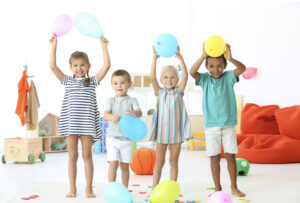
The physical development prime area in the EYFS curriculum is an umbrella of all things movement. Often thought of as only physical activity, physical development also covers coordination, fine and gross motor skills, strength, and balance.
Remember, some activities can be easier than others to motivate children to participate with!
Let’s jump into some physical development EYFS activities you may not have considered.
Mirror dancing
A no-resource game to play with your key worker children or for toddlers to play together. For this game, one person decides the movement and the other copies, you can direct this game to work more on fine motor skills and balance if they are areas the children are least interested in.
Jewellery making
A little technical for a toddler, no? Not when we involve pasta and string! Developing fine and gross motor skills through threading a pasta necklace is an excellent EYFS activity to build the muscles needed for a pincer grip (which will help with writing later on).
Litter picking
This EYFS activity idea builds physical strength and coordination and helps the planet: a triple threat. Wearing gloves for hygiene, take the children to the local park, beach or forest to clear some litter. You can encourage the parents to join in at home and send in a picture from their weekend litter walk!
For more EYFS physical development activities and advice on spotting ‘amber flags’, read our article on EYFS physical development activities: How to spot the amber flags.
Early years Literacy ideas for toddlers
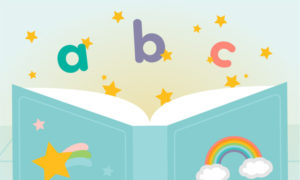
Early reading and phonics basics are a large part of Literacy in the early years. There are many EYFS Literacy activities to try that can spark the curiosity of learning involving tabletop tasks and free-flow play.
I-Spy (with my little eye)
“Surely, this simple game won’t help a child’s literacy skills?” It certainly will. Observing and identifying the names of objects around them while outside, walking around the park or even in the nursery setting boosts vocabulary acquisition.
Story Stones for the early years
A set of story stones can offer endless narrative inspiration. You can create your own together or buy them ready-made. Try placing the story stones in a dark bag or pillowcase and create a story from scratch, building the next plot twist every time a new stone is chosen.
10-clues game
This works best when a child can see the object somewhere in the room. Begin with more challenging clues and get progressively easier. The aim is to guess what is described before the ten clues are up.
An example for ‘socks’ might be:
- I am worn on your feet
- I can be fluffy
- I keep your toes warm etc.
Learn more about making early reading fun, including 18 reading area and literacy ideas, read our full article on How to make early reading fun: EYFS Literacy activities to try.
Early Maths activities for children
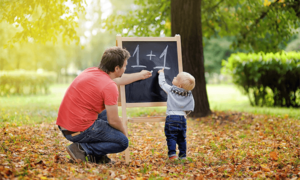
Another of the seven areas of learning is early mathematics. EYFS activities that include numbers can be explored from any age. Activities involving numbers, shapes, and space can introduce early numeracy concepts for toddlers.
Outdoor shape explorer
Collect some natural materials like sticks and leaves on your next outdoor walk. Encourage the children to make shapes with the resources they have. You can show them some 2D shape examples for some inspiration.
Money activities for early years
Being able to understand monetary value is a life skill. A basic understanding of money and its use to buy goods and services can be started in the early years. Set up a shop in your nursery.
Each item will have its own value (you may want to use counters or pieces of pasta). Children can ‘buy’ items they’d like for snacks. For example, an apple might cost four counters.
Try taking your maths outdoors with our article on Learning to teach maths outdoors, with 3 great maths activities to try. Or explore 12 great EYFS maths activities.
Easy ‘Understanding the World’ EYFS activities

Understanding the world around us is a valuable and worthwhile topic in the EYFS curriculum. In the nursery, children learn about different cultures, traditions, countries, and climates.
Here are some ‘Understanding the World’ activities for your childcare setting.
Mixing colours
We recommend starting with three colours for this activity and adding more later for further experimentation. With prediction in mind, the children will combine two or more colours on a paint palette or piece of cardboard. Encourage the children to identify any colour-mixing patterns.
Melting ice
The size of the ice cube you give your children to explore depends on your freezer space. Starting as small or as large as you’d like, place several ice cubes around the room on trays and notice the difference sunlight and shade make in the melting process.
Weather watcher
An excellent task to help make your nursery setting autism-friendly is monitoring the weather online, which can help children prepare for any changes to their routine (like wet playtime). It also allows them to learn about where they live and can be extended to other areas or countries.
We have plenty more ‘Understanding The World’ activities for you to try in your setting. Find them all on our ‘Understanding the World’ EYFS activities to blow them away blog post.
Early years activity ideas for expressive art and design
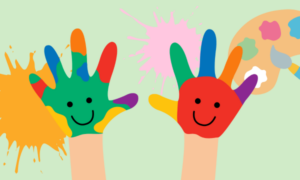
Children need no encouragement to be creative and get stuck into some art and design activities. There are plenty of art and design activities that don’t involve expensive resources, many can include recyclable materials, helping to save our planet as well as creating a masterpiece!
Let’s get recycling
Here’s where the toilet roll tubes come into play! Make a recycled masterpiece out of cardboard, milk cartons and boxes. Windchimes, telescopes or binoculars can all be made from a lowly toilet roll tube. Or, recycle plastic bottles and paint the bottom of the bottles to make sun catchers.
Vegetable stencils
A potato is a secretly creative vegetable. It can be made into delicious food, power a lightbulb and create artistic pictures. Using non-toxic paint, cut some shapes into potatoes to make stencils.
Expressive drama
Building confidence and language skills at the same time, a winner-winner. Encourage your child to re-enact their favourite story or scene of a film. If you have roleplay outfits to add to the drama, “even better, daarling”!
Find more Early Years art ideas to try in our 15 exciting expressive arts and design EYFS activities blog post!
Sensory activities for early years
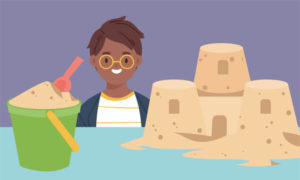
Did you know we have eight sensory systems? The common five are often focused on when planning sensory play activities for children. Whether you want to explore new textures or help regulate sensory systems, it is a staple for your early years planning.
Messy play ideas
Thinking of new and exciting messy play ideas that can ideally be contained within tuff trays can be tricky. Whether you want to know how to make slime or explore water sensory play, we have ideas for you!
Sensory bottles for toddlers
Water, clear glue, food colouring, glitter and a plastic bottle are all you’ll need to make a sensory bottle. You may want to stick small shapes, beads or even tiny toys into the bottle for the children to watch them float around. Do be mindful to securely fasten the bottles for safety.
Giant bubbles
Have a wire coat hanger or hula hoop knocking about your nursery? Add washing-up liquid and water into a big container, and you have a giant bubble maker! The sunlight bouncing off the bubbles can also show a rainbow of colours to notice.
Sensory play can be a lot of fun for children! Go beyond these three ideas with a whole 25 amazing sensory play activities for you to try.
Seasonal EYFS activity ideas for nurseries
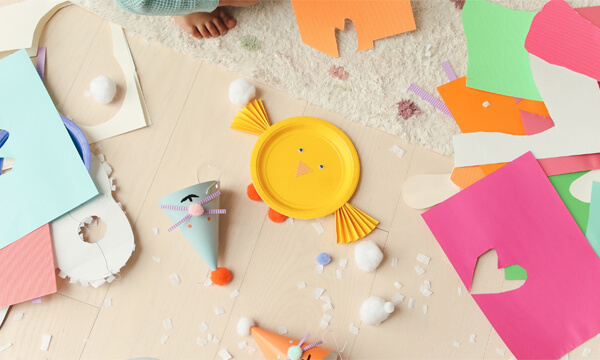
There are countless awareness and activity days you can jump on when planning EYFS activities, not forgetting the well-known seasonal events throughout the year.
Mother’s and Father’s Day activities
Any day that celebrates loving those who are important to us can be an inspiration for early years activities (including Valentine’s Day activities). Crafts for Father’s Day or Mother’s Day are even better when personalised.
Try using air-drying clay to make handprint paperweights, or share activity ideas via your Parent App to help families think of ideas to enjoy on these seasonal days (like planting sunflower seeds together).
Christmas EYFS activities
Christmas time in the early years is wonderful. Help to make the festive season even more exciting by including Christmas EYFS activities in your daily planning. Get dexterous with recycled paper chains or paper snowflake patterns with toddlers.
Easter EYFS activities
Easter EYFS activities may have Christian underpinnings depending on the ethos and background of your nursery. There may also be a selection of Easter craft ideas included in your learning opportunities in the spring. Great Easter activities like egg rescue can work on strategy, coordination and balance.
World Earth Day ideas
Celebrated yearly, World Earth Day is a fantastic opportunity to raise awareness about how to care for the planet from an early age. There are many early reading books to increase language acquisition whilst discussing essential matters like climate change), like 10 Things I Can Do To Help My World.
Islamic New Year ideas
Teaching the children about different religious celebrations is a way to engage parents from all backgrounds and beliefs and widen their understanding of the world they live in.
Recognising religious events, such as the Islamic New Year, in the nursery via discussing reflections and giving thanks for the past year can be a good place to start.